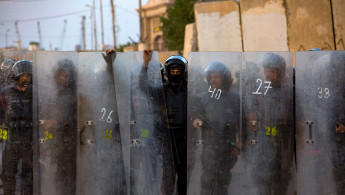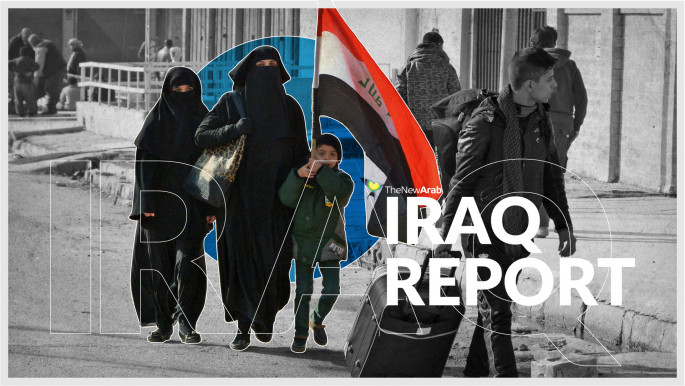The Iraq Report: Saddam-era defamation laws used to silence dissent
The indictments and arrest warrants have come at a time when the Iraqi High Electoral Commission has ruled that Iraqis living outside of Iraq will be prohibited from voting in the upcoming elections scheduled to take place later this year, raising fears diaspora voices will be marginalised and further shift the electoral balance in favour of Iraq's existing elites.
Geopolitically, Iraq continues to be a battleground between American and Iranian power players, as both sides seek to mould Iraq in their favour. This time, however, Iran appears to still be intent on avenging the death of Qasem Soleimani, the top Iranian general who was assassinated by the Trump administration in early 2020.
To that end, its proxies have made several demonstrations of force within Iraq while American intelligence suggests that Tehran may be plotting to attack a military based inside the mainland US – a massive escalation if true.
Baathist-era laws used to silence critics
In the latest clamping down on civil rights, government prosecutors will be relying on Baath-era defamation laws to indict two political analysts, prompting anger that laws imposed by a dictatorial regime are now being used to shut down critics in a country which is constitutionally bound by democratic principles.
 |
Iraqi authorities have issued arrest warrants against two prominent critics of the post-2003 political process and order, accusing them of defaming public officials |  |
Ibrahim al-Sumaidaie and Yahya al-Kubaisi, two well-known political commentators, had arrest warrants issued in their name by the Supreme Judicial Council on charges that they had "insulted" and "defamed" public authorities and officials.
While Sumaidaie was arrested a fortnight ago late at night outside his home in the capital Baghdad, Kubaisi escaped arrest by virtue of the fact that he lives abroad.
Sumaidaie was later released on bail after five days in detention. Upon his release, Sumaidaie commented that, if necessary, he would "leave Iraq" and that he believed "Iraq deserves a more honourable political process."
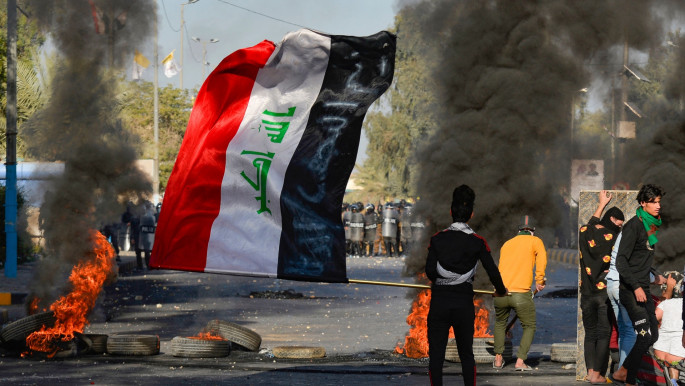 |
|
| The Iraq Report: Killings, abductions rise immediately after Pope Francis' visit |
According to the judicial council's statement, as reported by CNN, the warrant against Sumaidaie was issued by Baghdad's Al-Karkh Investigation Court under Penal Code Article 226 for insulting "official institutions" by using "bad phrases" which "go beyond the limits of the freedom of expression." If his prosecution goes ahead, he could face up to seven years in jail, according to Iraqi law.
Although Iraq adopted a new democratic constitution following the US-led invasion that toppled the dictatorial Baathist regime in 2003, there are significant concerns that these legal changes are at least partially cosmetic due to the continued existence of Saddam-era laws.
The prosecutors will be relying on laws which originate in a 1969 penal code which was enacted following the Baathist revolution of 1968. At that point in time, Ahmed Hassan al-Bakr was president and, upon ascending to the presidency himself, Saddam Hussein kept the penal code in force.
Taking to Twitter, independent lawmaker Mohammed al-Sudani described the arrest warrants as "very dangerous", adding that "this is taking place at a time when murderers, criminals, and corrupt individuals enjoy their full freedoms."
"It is as if the aim [of the arrests] is to inform everyone that expressing a contrarian view has a price," Sudani said.
The arrests are being viewed as a way of silencing dissent against the established political elite, many of whom are closely intertwined with regional and global powers, including Iran and the United States.
 |
In the latest clamping down on civil rights, government prosecutors will be relying on Baath-era defamation laws to indict two political analysts, prompting anger that laws imposed by a dictatorial regime are now being used to shut down critics |  |
The positions of power enjoyed by the political elite appear to have been further assured by the Iraqi High Electoral Commission who ruled that only Iraqis living within Iraq will be eligible to vote in the upcoming elections later this year.
The commission released an official statement explaining that the decision was taken due to "technical, financial and health issues linked to the Covid-19 crisis".
Eradaa Movement MP, Hussain Arab, who has joined former controversial Shia Islamist Prime Minister Nouri Al-Maliki's coalition for this year's vote, welcomed the decision and said that those who wanted to participate "should return to Iraq".
He claimed that elections in 2018 had resulted in fraud in some countries, without specifying them, while acknowledging there could be opposition to in some political quarters. In contrast, Ali Al-Issawi, a leader in the majority-Sunni Iraqi Forces Alliance, decried the move.
"We oppose the marginalisation of the voice of any Iraqi, and depriving them of opportunity to participate in the electoral process outside of Iraq," Issawi said in a press conference addressing local media.
"The groups outside of Iraq that will be denied the opportunity to vote are the Sunni and Kurdish communities. This will impact political representation for these groups." However, it is not only Sunni and Kurdish minority groups that may be denied a voice.
Iraq's last election in 2018 attracted a paltry 44.5 percent turnout despite the inclusion of diaspora votes. The reason for this was the widespread perception that the process was a corrupt, foregone conclusion.
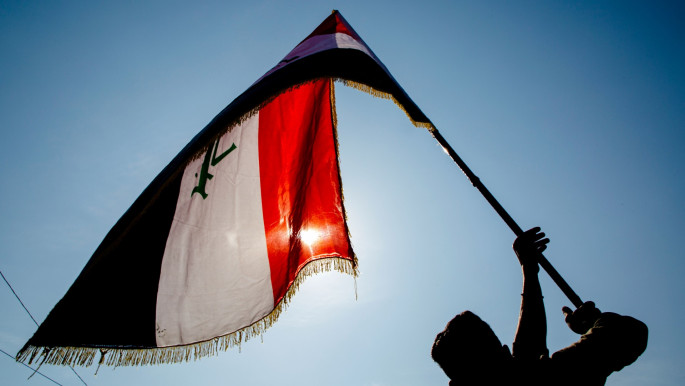 |
|
| Read more: Why Iraq's protest movement fears being co-opted by political elites |
When the Shia-dominated protest movement of 2019 sought to apply pressure for meaningful electoral, political, and economic reform, their movement was faced with deadly violence by both state security forces and allied pro-Iran Shia militias. Hundreds have since been killed while tens of thousands suffered severe wounds, tortured, or were forcibly disappeared.
Through the continued use of violence and arrests to clamp down on criticism and demonstrations, it is likely that Iraq has further eroded its already tenuous democratic credentials and thereby undermined its electoral legitimacy.
It may therefore be the case that the elections this year will see a similarly low turnout unless breakout youth-led and non-sectarian parties successfully make the political case for structural reform and receive enough votes from a disillusioned population to make it to parliament.
Iran and US continue Iraq brinkmanship
The continued brinkmanship between Washington and Tehran continues unabated in a series of reciprocal events and threats, with Iraq once more taking centre stage as both countries' preferred arena of conflict.
While the Biden administration has indicated to the Baghdad authorities that they want to continue Trump-era discussions on the withdrawal of the remainder of the American forces still in Iraq, that has not stopped Iran and its proxies from continuing to escalate against Washington.
An Iraqi Shia militia, which calls itself Rabu' Allah, organised an armed parade in late March with displays of its fighters and weaponry in the centre of Baghdad, as state security stood idly by.
The militia, which is one of the fronts of Kataib Hezbollah – also known as the Iraqi Hezbollah due to its association with both Iran and the Lebanese Hezbollah – held the parade in Baghdad with heavy vehicles carrying rocket launchers among other military equipment.
 |
Through the continued use of violence and arrests to clamp down on criticism and demonstrations, it is likely that Iraq has further eroded its already tenuous democratic credentials and thereby undermined its electoral legitimacy |  |
State security forces stood and watched without intervening while the streets were at a standstill as the parade took place, witnesses told The New Arab's Arabic language service. Shops were not able to open and businesses were halted. The group made speeches honouring "martyrs" and threatening the United States.
"We salute the arms of the mujahideen and their rifles that roamed the land of the capital, Baghdad, this day in a message of threat to America and their regional agents," Rabu' Allah said in a statement, as circulated by local media.
In response, the US Department of Justice blocked two websites belonging to the Iran-backed Iraqi group less than 24 hours after the militia paraded through Baghdad.
Kevin Kurland, the US Deputy Assistant Secretary for Export Enforcement said, "We will continue to aggressively disrupt Foreign Terrorist Organizations such as Kata'ib Hezbollah and their efforts to utilize US cyber infrastructure to harm US national security."
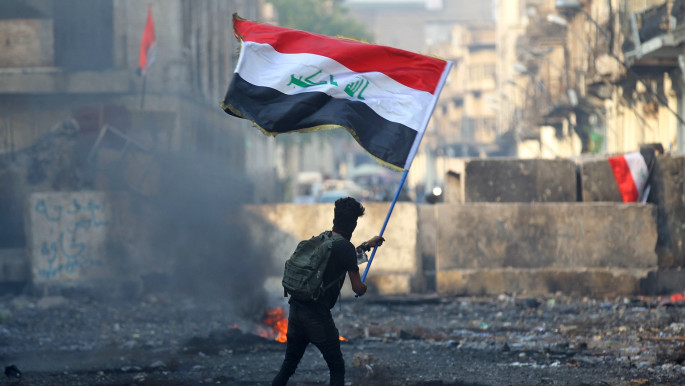 |
|
| Read more: 'Old faces, new names': The disingenuous promise of early elections in Iraq |
The US Department of Justice has previously shut down other Kataib Hezbollah-linked sites including "Aletejahtv.com" and "Aletejahtv.org" in August 2020 and "Aletejah.tv" and "kataibhezbollah.com" in October 2020. The sites were registered in Virginia and Arizona.
The Iran-backed group has been designated as a terrorist organisation by the US Department of the Treasury since 2009, which claimed that Kataib Hezbollah was a threat to Iraqi national security.
The group stormed the US Embassy in Baghdad in December 2019 following deadly US airstrikes on one of its bases in Syria, as tensions flared between the Trump administration and Iran which led to the assassination of Qasem Soleimani, the former head of Iran's Islamic Revolutionary Guard Corps' (IRGC) Quds Force.
US intelligence sources are now suggesting that the IRGC are planning an attack on a major American base in the mainland US, Fort McNair, and are further planning to assassinate Vice Chief of Staff General Joseph Martin as revenge for the loss of Soleimani.
It is unclear how the Biden administration intends to respond to this. While it is clear that the White House is currently pursuing a more dovish policy to coax Iran back to the negotiating table and to recommit to the nuclear deal that was scrapped by the Trump administration, an attack on US soil and against top American generals would effectively tie Biden's hands.
Biden would have to respond vigorously or else risk losing the argument for how best to deal with a recalcitrant and ascendant Iran, handing the moral victory to Trump who long argued that Tehran only understood the language of force.
